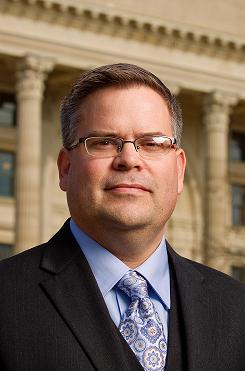
Caleb Stegall today was appointed by Gov. Sam Brownback to a vacancy on the Kansas Supreme Court.
Stegall, formerly the governor’s chief counsel, was appointed to the Kansas Court of Appeals in August 2013 by Brownback. Stegall was one of three finalists advanced by the Supreme Court Nominating Commission for the appointment.
The vacancy on the Kansas Supreme Court occurred when Justice Nancy Moritz was appointed to the 10th U.S. Circuit Court of Appeals.
Stegall lives in Perry, Kan., and is a former district attorney of Jefferson County. He has spent most of his life in Douglas and Jefferson counties. A native of Topeka, he is a conservative who has previously defended cases involving Kansas Republicans.
He was the attorney in a lawsuit filed by some Kansas City, Kan., residents in 2008 opposing the possible use of public funds to build a Wyandotte County casino. He also helped to free American missionaries who were held in Haiti after an earthquake in 2010.
“Justice Stegall will be an excellent addition to the Kansas Supreme Court,” Gov. Brownback said in a news release. “His strong legal background, temperament and dedication to justice will serve the citizens of Kansas well for many years to come. Selecting justices is one of the most important constitutional duties of a governor, and I am honored to select Caleb Stegall.”
Stegall graduated third in his class at the University of Kansas School of Law, and then served as a law clerk at the U.S. 10th Circuit Court of Appeals.
“I am humbled and honored to be appointed to the Kansas Supreme Court. I know I have big shoes to fill and I look forward to going to work every day devoted to our State’s promise of a fair and impartial judiciary, committed to the rule of law,” Stegall said in the news release. “To paraphrase Justice Nancy Moritz’s final opinion on the court, I will strive every day to work under no compulsion other than the ever-present compulsion to follow the law rather than my personal opinions.”
After the announcement, the Kansas Values Institute issued a statement on the appointment.
“Brownback recently told reporters that there would be no ‘favoritism’ in the selection of the next Supreme Court justice, but he has clearly chosen the least qualified, least experienced nominee of the three that were offered,” said Ryan Wright, executive director of the Kansas Values Institute, in a news release. “The merit selection process worked, but what didn’t work was a governor who was determined to double-down on his ultra-right agenda in the face of two nominees that, by any measure, were much more qualified.”
Wright stated that Brownback has been injecting politics into the judicial branch and experimenting with the courts by changing the way Kansas Court of Appeals judges are selected.
